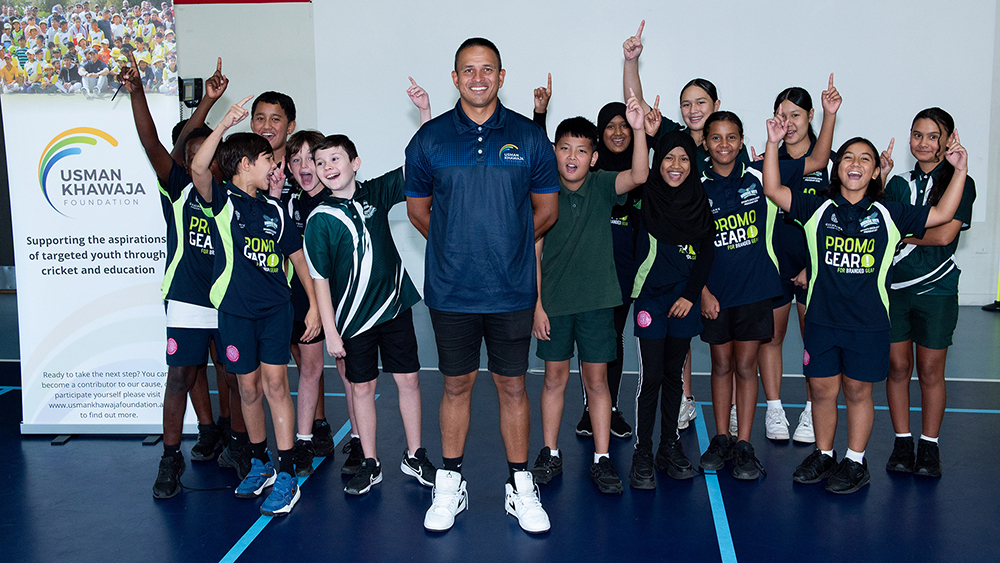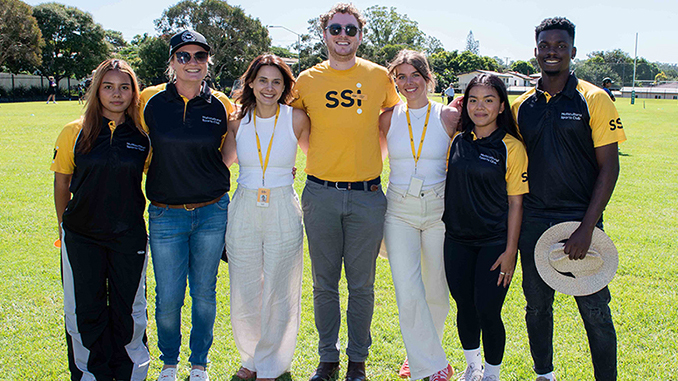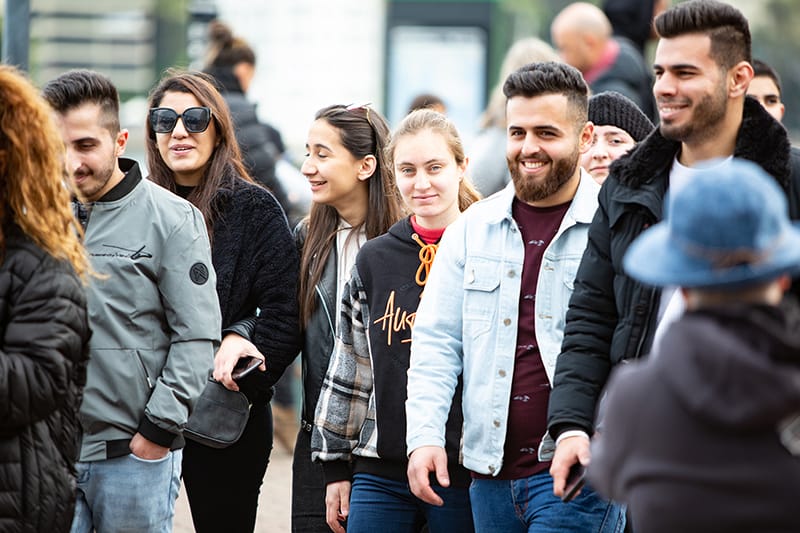Leading refugee resettlement and multicultural services provider SSI has welcomed Peter van Vliet as its new Board Chair.
(more…)Leading refugee resettlement and multicultural services provider SSI has called for a more collaborative approach and greater commitment to refugee protection in light of smaller resettlement quotas and negative political rhetoric around the world.
(more…)Leading refugee resettlement and multicultural services provider SSI has praised the establishment of the NSW Settlement Advisory Council announced by the Minns Labor Government on World Refugee Day last Friday.
(more…)Newly arrived refugee artists will showcase their incredible talents, share their stories, and express their cultural heritage through art, music, performance and food at SSI’s Spirit of Welcome Community Festival this Sunday June 15 2025.
(more…)Settlement Services International (SSI) and the Usman Khawaja Foundation (UKF) have joined forces to launch a dynamic new partnership using the power of cricket to support children and young people from refugee and migrant backgrounds.
The initiative kicked off on 22 April 2025 at Woodridge North State School in Queensland, where students were treated to a special cricket clinic led by Usman Khawaja himself, alongside trained coaches. The school oval was awash in green and gold as students practiced batting, bowling and fielding — for many, their first introduction to the game.
This innovative collaboration aims to use sport as a bridge to connection, wellbeing and community inclusion. Through a series of joint cricket clinics across Queensland, New South Wales and Victoria, young people will develop skills both on and off the field — fostering resilience, physical and mental wellbeing, and a sense of belonging.

SSI CEO Violet Roumeliotis said the partnership reflects a shared commitment to inclusion and opportunity.
“Both SSI and UKF are strongly aligned in their values of empowering youth from refugee and migrant backgrounds to fulfil their aspirations and help shape a more socially cohesive Australia,” Ms Roumeliotis said.
“Sport has always been a powerful way to bring people together. Initiatives like this transform lives by creating pathways for children to connect, grow and thrive.”
Australian cricketer Usman Khawaja knows first-hand the power of sport to unite and inspire. Having arrived in Australia from Pakistan at the age of four, he became the first player of Pakistani descent to represent Australia in cricket.
“Cricket has long been an iconic Australian sport and an integral part of our culture,” Mr Khawaja said.
“Education and community sport play an important role in helping young people from migrant backgrounds engage and connect with Australian life and feel a true sense of belonging. Cricket is not just a game — it’s a bridge to new beginnings.”
The new partnership will also extend beyond the pitch. Over time, it will expand to include youth mentoring programs, community events such as Multicultural Cups, and an innovation hub where young people from refugee backgrounds can co-design solutions to the unique challenges faced by their communities.
The program builds on the successful work of the Logan-based SSI Multicultural Sports Club which provides accessible sporting opportunities for diverse communities and promotes inclusion through structured physical activity.
Ms Roumeliotis said: “The values and dedication shown by the Usman Khawaja Foundation perfectly align with our vision of a unified, thriving Australia where every newcomer feels at home.”
Mr Khawaja added: “I’m thrilled to be part of a partnership that not only inspires children to play cricket but gives them confidence, resilience, and hope for the future.”
By combining SSI’s community-based programs with UKF’s leadership in sport-led inclusion, the partnership sets the stage for a new era of youth empowerment and cultural connection — one cricket clinic at a time.

Settlement Services International (SSI) welcomes the Albanese Government’s 2025-26 Federal Budget and continuing measures to address cost of living pressures and promote social cohesion which goes some way to delivering stronger inclusion and integration for multicultural communities.

SSI CEO Violet Roumeliotis said, “SSI commends the government’s investment of $178.4 million over five years to support social cohesion, which includes vital funding for multicultural organisations to deliver tailored programs and services to the communities they serve and continuing to address the recommendations of the Multicultural Framework Review.
SSI welcomes $3.5 million over three years (and $1.2 million per year ongoing) to embed the Community Refugee Integration and Settlement program following the conclusion of a pilot. We recommend this critical stream to Australia’s humanitarian response is in addition the current overall humanitarian intake.
SSI acknowledges the extension of the Economic Pathways to Refugee Integration program to boost refugee employment and a raft of sector-specific measures to address skills shortages in health, construction and energy. However, SSI is disappointed at the lack of action by the Government for urgent reforms to unlock the skills of 620,000 permanent migrants already in Australia as one in three professions face critical skills shortages.
“Since the launch of the Activate Australia’s Skills campaign, over 100 organisations and fourteen of Australia’s most influential leaders have called for urgent reforms to the skills and qualification recognition system” says SSI CEO, Ms Violet Roumeliotis AM. “Our campaign has provided costed, ready to go solutions for systemic reforms and place-based employment hubs to remove persistent barriers impacting refugees and migrants which could inject $9 billion annually into Australia’s economy. A piecemeal and sector-specific approach to skills shortages is not the most meaningful investment to unlock the skills of migrants.”
SSI also cautiously welcomes the announcement of $364.5 million for foundational supports for people with disability and the Information, Linkages and Capacity Building program. We know that people with disabilities from multicultural backgrounds are significantly under-represented in the NDIS and we also know that they also struggle to access mainstream services, like health, delivered by states and territories. SSI is calling for more detail on how a long-term agreement for foundational supports to access mainstream services will be struck with states and territories.
In terms of cost of living, SSI welcomes the government’s measures to increase bulk-billing incentives for GPs, establish more urgent care clinics, make PBS medications cheaper, provide energy bill relief and subsidise certain medications and treatments under a new women’s health package.
SSI also welcomes the commitment of the Albanese government to increase funding for public schools, cut student debts by 20% to address intergenerational unfairness and build a universal system of early childhood education and care ensuring that every child has the right to three days of subsidised early education to ensure they don’t start school behind.
While this moves Australia closer to universal access to early childhood education, SSI sees that it will not address the financial and non-financial barriers we see multicultural families face in accessing early childhood education.
SSI’s and UniSA research, Stronger Starts, Brighter Futures II (2024), found that children from multicultural backgrounds in Australia are much less likely to participate in early childhood education and start school behind. SSI calls for governments at all levels to improve access by multicultural children and families through a mix of targeted and place-based interventions that complement universal approaches like those announced in this budget.
Ms Roumeliotis added, “This Budget represents meaningful progress towards building stronger, cohesive communities across Australia, but we urge the government to act decisively on unlocking migrant skills, improving employment pathways, and progressing disability and early childhood education reforms in ways that ensure greater equity. True social cohesion can only be achieved when every Australian – regardless of their background – has the opportunity and support to fully participate in our society and economy.”
Media enquiries:
Sharon Lanyon, Group Head Strategic Communications & Engagement
M: 0413 595 946 E: slanyon@ssi.org.au
Sandy Fitter, Group Head Stakeholder Relations, Research & Policy
M: 0402 771 390 E: sfitter@ssi.org.au
We are calling for urgent action to lift Australia’s humanitarian intake, as new research from United Nations High Commissioner for Refugees (UNHCR) shows the number of people experiencing forced displacement increased at a record-breaking rate in 2023.
The UNHCR’s Global Trends: Forced Displacement in 2023 has found that more than 117 million people were forcibly displaced by violence, conflict, and persecution in 2023 – up by almost 9 million people from the prior year.
Forced displacement is estimated to have continued rising in the first four months of 2024, likely surpassing 120 million by the end of April.
For the past 12 years, the UNHCR has recorded annual increases in forced displacement, with each year setting a new record.
This record-breaking displacement highlights the need for the Australian government to uplift the humanitarian intake to respond to pressing global need.
We are calling on the Australian government to meet its commitment to increase the humanitarian intake from 20,000 places to 27,000 places per annum.
Despite the rapidly growing need for resettlement places, the size of Australia’s Humanitarian Program had remained relatively stagnant for decades.
Scaling up the program would help address the significant global shortfall in resettlement places, reunite refugees already in Australia with their families, and showcase Australia’s commitment to being a responsible global citizen.
There is also widespread recognition globally of the need for a range of permanent and secure pathways for the growing numbers of refugees around the world. This includes complementary pathways such as community sponsorship. It is an innovative solution that enables everyday community members to step up to protect people displaced by conflict and persecution.
Australia’s refugee resettlement sector has the skills and expertise to quickly scale up and support an increased refugee intake. We simply ask the government to open the door.
Read the UNHCR’s full report here: https://www.unhcr.org/global-trends
SSI welcomes the Federal Government’s announcement of a new study that will tackle antisemitism, Islamophobia, and the experience of First Nations people within the Australian university sector. The study aims to examine racism in universities and provide recommendations to ensure the safety of students and staff members.
Australia needs to create a safe environment for everyone, irrespective of their language, race or cultural background.
What is clear from the growing evidence base is that racism is prevalent in Australian communities. Racism poses a significant social and economic threat to our country.
Efforts to support social cohesion must go beyond the positive promotion of multiculturalism and actively denounce racism.
We view this study, which will be led by the Race Discrimination Commissioner, as an important step towards better understanding the prevalence and impact of racism and, importantly, practical actions to reduce it.
SSI continues to call for a coordinated, national response to eliminate racism and promote social inclusion, both on campuses and across our country. Australia will be stronger and safer for it.
New funding announced in this week’s Federal Budget will offer some support to families fleeing the conflict in Gaza, many of whom are currently at risk of homelessness and poverty, according to non-profit organisation, Settlement Services International (SSI), which provides human services to around 50,000 people a year.
SSI welcomed the Federal Budget announcement of a $900k injection to extend Medicare eligibility to 30 June 2025 for Bridging Visa E holders arriving from affected areas of Israel and Palestine.
SSI CEO Violet Roumeliotis said families had escaped the crisis in Gaza only to arrive in Australia and find themselves largely reliant on charities like SSI, which is currently supporting close to 70 families.
“The situation in Gaza has worsened and worsened. With no hope of return, families are now navigating the process of applying for asylum in Australia, but in the meantime, their visa types mean they are mostly unable to work and ineligible for government support.
“At a time of rising costs of living, this has translated to families sleeping in cars, or living with 14 people in two-bedroom apartments,” she said.
“We welcome the extension of Medicare eligibility, noting however that most of the families we work with are currently not on visa types that are eligible for this support. More needs to be done so that refugees from Gaza receive the same support as people fleeing conflict in places like Ukraine.”
Ms Roumeliotis said it was encouraging to see broader measures to support people who are building new lives in Australia, such as a $120.9 million investment to strengthen the settlement sector and enhance outcomes for refugees and migrants.
“Robust on-arrival and settlement support is critical to ensuring newcomers are positioned to realise their full potential in Australia. It was welcome to see measures to this effect, including a modest increase in funding for some of the core settlement programs that support these outcomes,” she said.
“Disappointingly, the humanitarian intake will remain static at 20,000 places, despite record-breaking global numbers of people who are currently forcibly displaced from their homes by violence, conflict and persecution.
“A scale-up of our humanitarian intake is needed to meet the massive shortfall in resettlement places globally. It would also open up more opportunities for refugees already settled here to be reunited with family and, critically, allow Australia to demonstrate its credentials as a strong global citizen.”
Ms Roumeliotis said a strong theme of the budget was women’s safety, ranging from economic security to targeted violence prevention measures and more.
“It is a scary time to be a woman in Australia. An average of one Australian woman is violently killed every week, a significant portion of which occurs in intimate and family settings. There is no panacea for this, but this budget includes significant investment to make women’s lives safer and more equitable,” she said.
Ms Roumeliotis said SSI welcomed a number of other budget measures designed to improve access and equity in Australia, including:
- $27 million over three years to extend targeted support for Youth Transition Support services, which assist refugee and migrant youth to access education, employment and government services.
- $253.6 million over five years to reform employment services and supports for people with disability.
- $468.7 million over five years to support people with disability and get the NDIS back on track.
$925.2 million over five years to improve financial support, safety assessments and referrals to support services for victim-survivors leaving a violent intimate partner relationship.
Media enquiries:
Hannah Gartrell, Head of Executive Communications and Media
M: 0423 965 956 E: hgartrell@ssi.org.au
SSI welcomes the vision set out in the Federal Government’s newly released Early Years Strategy as a step towards early childhood policies, programs and services that will support the best outcomes for all children, regardless of their backgrounds.
This Early Years Strategy is underpinned by the principles of equity and inclusion, including a commitment to provide foundational supports to children with potential developmental delays and to address these concerns early.
We also commend the focus on maintaining children’s identities and cultural connections. This sits alongside a commitment to empower parents, caregivers and families in ways that are culturally responsive and targeted – something we see the importance of throughout our work with culturally diverse families, including as part of the national Community Hubs program.
From our work delivering place-based initiatives such as our involvement in Logan Together, we recognise the importance of local solutions for local problems, reflected in the Strategy.
Importantly, this is Australia’s first Early Years Strategy to strengthen accountability, coordination and collaboration across all levels of government over the next 10 years, setting a clear roadmap for change with action plans and an outcomes framework to monitor and track progress. SSI looks forward to being part of these collaborative initiatives and translating them into tangible outcomes for all Australian children.
